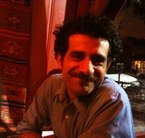非常抱歉,
你要访问的页面不存在,
非常抱歉,
你要访问的页面不存在,
非常抱歉,
你要访问的页面不存在,
验证码:

职称:Associate Professor of Spanish
所属学校:University of North Carolina at Chapel Hill
所属院系:Department of English and Comparative Literature
所属专业:Comparative Literature
联系方式:919.962.1024
At the age of fifteen I decided to be a teacher. I enrolled in a magnate high school for teacher training in my native Colombia, and since then my passion for research and education has not withered. With time, I pursued my studies in Philosophy, Social Communication, Journalism, and Contemporary Problems Analysis. After a four-year period as an editor for a Colombian publishing house I moved to the United States and received my Ph.D. at Cornell University. I am the author of On the Dark Side of the Archive: Nation and Literature in Spanish America at the Turn of the Century (Bucknell UP, 2010). It examines nineteenth-century nation building through narratives that are not part of the romantic or realist traditions, especially those associated with the critique of traditional ideals often portrayed in decadentism and modernismo. The study focuses on the “non-canonical” works of turn-of-the-century authors like José María Vargas Vila, Horacio Quiroga, Clemente Palma, and José Martí, and concludes with a study that compares the literary portrayal of doomed societies in the nineteenth-century with the work of contemporary authors like Fernando Vallejo. Together with William J. Acree Jr., I have co-edited Building Nineteenth-Century Latin America: Re-Rooted Cultures, Identities, and Nations (Vanderbilt UP, 2009). This volume studies the manner in which culture and identity took root as the new nations and state institutions were being fashioned across Latin America after the wars of independence. The essays tease out the power of print and visual cultures, examine the impact of carnival, delve into religion and war, and study the complex histories of gender identities and disease. My research interest in a new approach to sources previously considered secondary has permitted me to publish extensively on José María Vargas Vila (1860-1933), a writer whose production was widely known in the Spanish-speaking world at the turn of the nineteenth century, but which collapsed when confronted with the idealized purposes invested in literature by the status quo. Pursuing my interest in nineteenth-century topics with a broad approach, I have also published pieces on Porfirio Barba-Jacob, Clemente Palma, and José Martí, as well as translations of works by Harriet Beecher Stowe and Kahlil Gibran.
At the age of fifteen I decided to be a teacher. I enrolled in a magnate high school for teacher training in my native Colombia, and since then my passion for research and education has not withered. With time, I pursued my studies in Philosophy, Social Communication, Journalism, and Contemporary Problems Analysis. After a four-year period as an editor for a Colombian publishing house I moved to the United States and received my Ph.D. at Cornell University. I am the author of On the Dark Side of the Archive: Nation and Literature in Spanish America at the Turn of the Century (Bucknell UP, 2010). It examines nineteenth-century nation building through narratives that are not part of the romantic or realist traditions, especially those associated with the critique of traditional ideals often portrayed in decadentism and modernismo. The study focuses on the “non-canonical” works of turn-of-the-century authors like José María Vargas Vila, Horacio Quiroga, Clemente Palma, and José Martí, and concludes with a study that compares the literary portrayal of doomed societies in the nineteenth-century with the work of contemporary authors like Fernando Vallejo. Together with William J. Acree Jr., I have co-edited Building Nineteenth-Century Latin America: Re-Rooted Cultures, Identities, and Nations (Vanderbilt UP, 2009). This volume studies the manner in which culture and identity took root as the new nations and state institutions were being fashioned across Latin America after the wars of independence. The essays tease out the power of print and visual cultures, examine the impact of carnival, delve into religion and war, and study the complex histories of gender identities and disease. My research interest in a new approach to sources previously considered secondary has permitted me to publish extensively on José María Vargas Vila (1860-1933), a writer whose production was widely known in the Spanish-speaking world at the turn of the nineteenth century, but which collapsed when confronted with the idealized purposes invested in literature by the status quo. Pursuing my interest in nineteenth-century topics with a broad approach, I have also published pieces on Porfirio Barba-Jacob, Clemente Palma, and José Martí, as well as translations of works by Harriet Beecher Stowe and Kahlil Gibran.